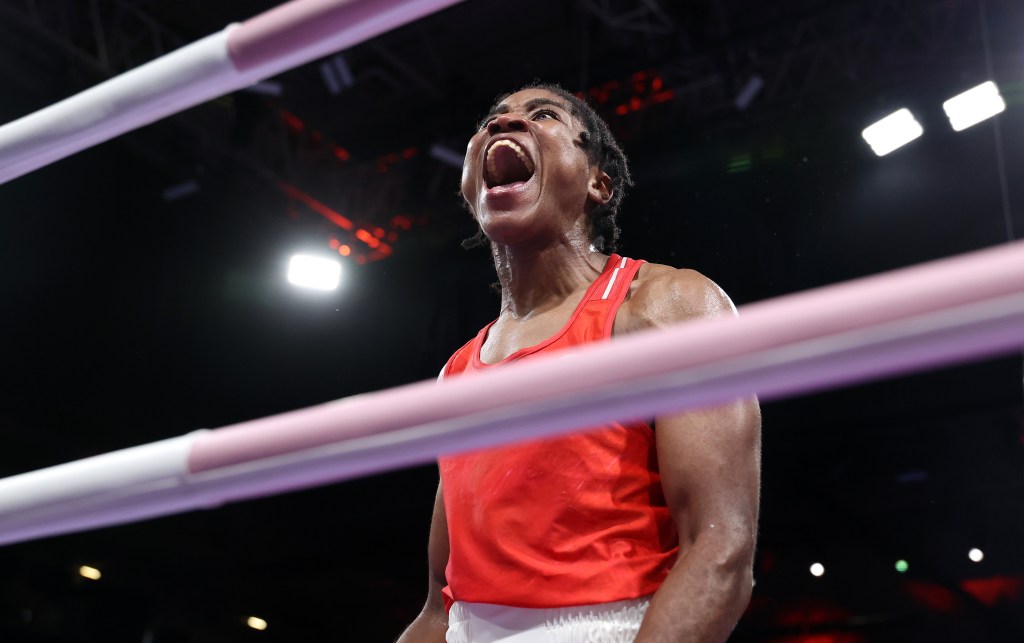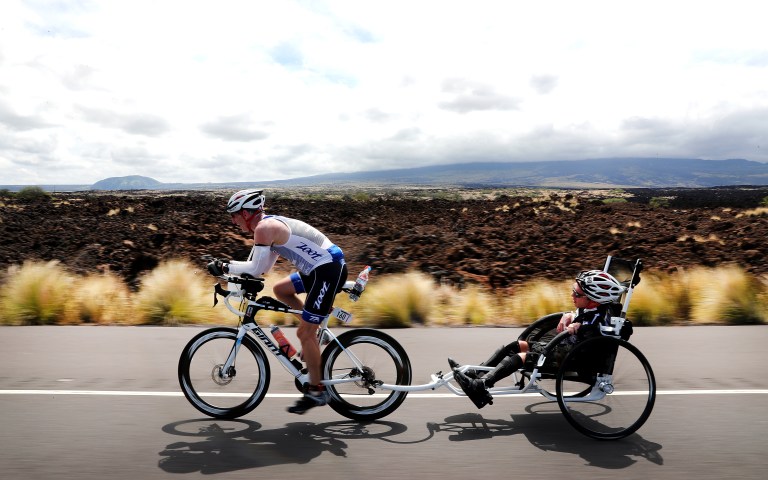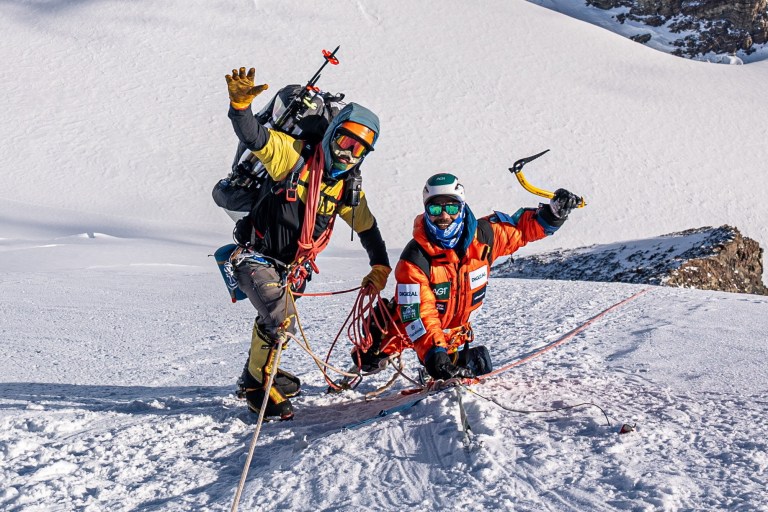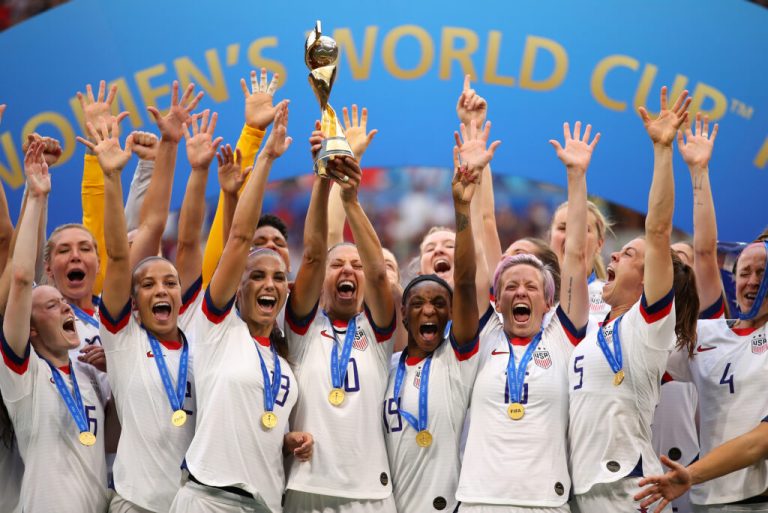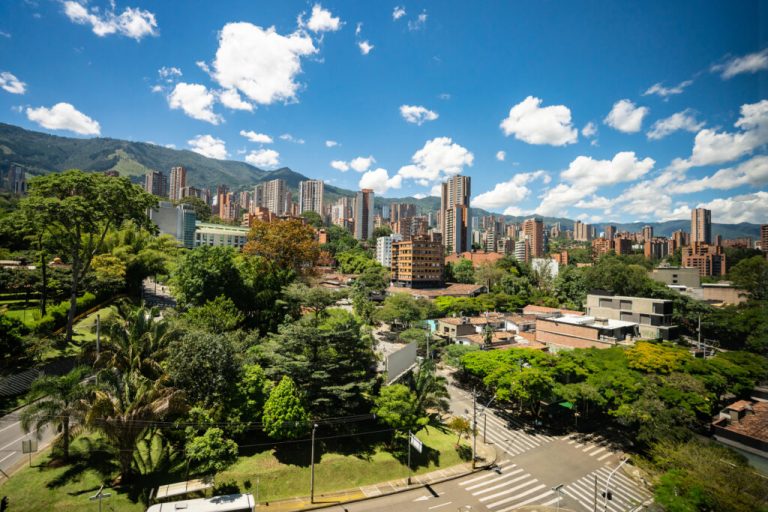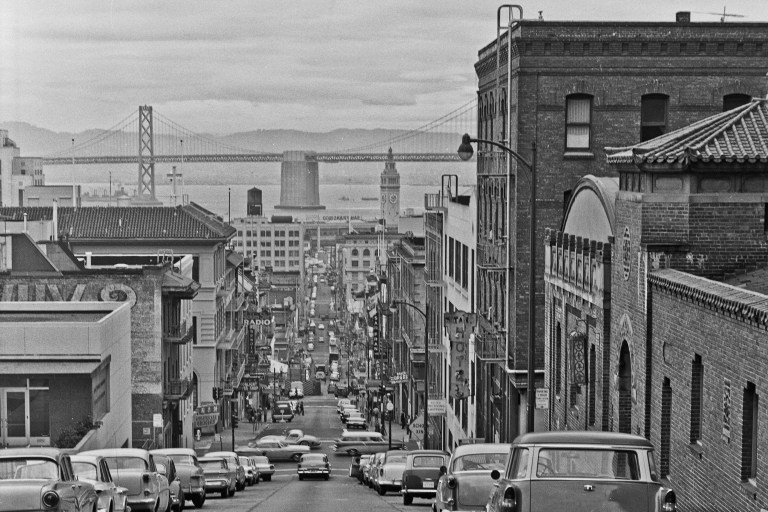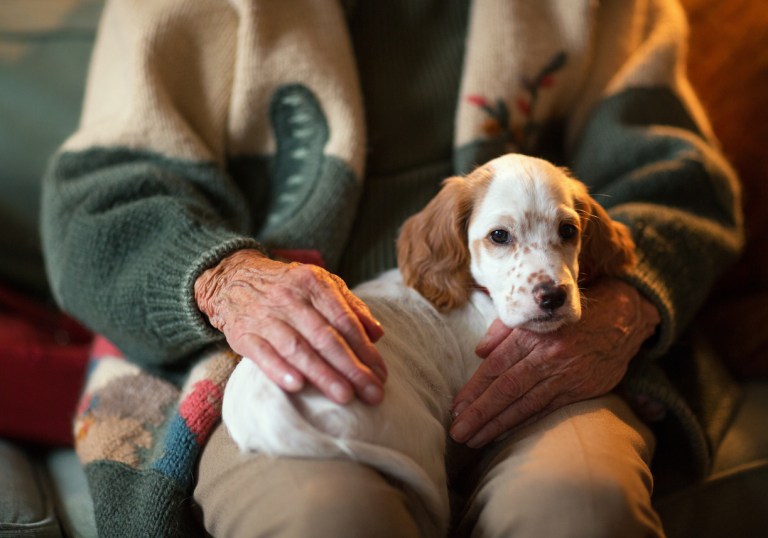Boxer Cindy Ngamba shattered a glass ceiling for the International Olympic Committee’s Refugee Olympic Team on Sunday: securing their first medal at any Olympic Games since the team’s formation in Rio in 2016.
Last Wednesday, the 25-year-old made a huge crack in that glass ceiling as the first member of the EOR, or French équipe olympique des réfugiés, to advance to the quarterfinals, Sports Illustrated reported. She secured a 3-2 split decision victory against Canada’s Tammara Thibeault in a highly competitive women’s boxing match, in which Thibeault was favored to win. Ngamba’s triumph immediately rippled throughout the EOR and refugee community, with a video of teammate Amir Ansari’s live reaction embodying the emotion and significance of the moment.
Following that history-making win, all eyes were on Ngamba going into her highly publicized Sunday quarterfinals match against France’s Davina Michel, the heavily favored hometown hero. And in a performance reflective of her lifetime of defying expectations and overcoming seemingly insurmountable barriers, Ngamba left the ring a champion, to rapturous global applause.
“It means the world to me to be the first-ever refugee to win a medal,” she told reporters after her win, per the Associated Press. “I want to say to all the refugees around the world … keep on working hard, keep on believing in yourself.”

Cindy Ngamba (right) competes against France’s Davina Michel (left) during the women’s 75 kg quarterfinal match on Sunday
Her trailblazing performance has sent waves of inspiration to refugees — and anyone facing adversity — around the world. “I hope that by them watching me, they can see that everything in life I have gone through, I was able to overcome it,” she told Sports Illustrated.
As reported by France 24, boxing issues bronze medals for losing semifinalists, meaning Ngamba is guaranteed a medal in the women’s 75 kg. She will compete next on Thursday, Aug. 8.
RELATED: This Tween Skateboarder and Veteran Equestrian Are Paris’ Youngest and Oldest Competing Olympians
Born in Cameroon, Ngamba moved to England at age 11, where she had difficulty communicating across language barriers and was bullied for being shy and overweight. A self-described “tom boy” from a young age, she loved following her brother around and playing sports with him and his friends.
As an early teen, she joined a community sports program. While she initially got her start running, she felt an immediate draw to the boxing program the first time she saw the intensity of training, the “pum pum” of the punching bags, and the steam radiating off the boys after an intense workout. After asking to join the program, she was put to the test: nearly two years of jump rope conditioning training, before she was ever allowed to step foot in the ring and fight.
As the only girl in the program, she quickly established herself as a force as soon as she entered the ring. She held no punches in fighting the boys, and she’s been punching through countless stereotypes and obstacles ever since. In 2019, Ngamba was arrested at a routine immigration appointment in Manchester and sent to a detention center outside of London. She was unclear on what exactly happened, but as an out lesbian, she knew she couldn’t go back to Cameroon, where homosexuality is a criminal offense. She sought and was granted refugee status.
Even with deep ties to England, and the support of GB Boxing endorsing her application, Ngamba has repeatedly been denied citizenship. Despite that, she’s considered an honorary member of the Great Britain Boxing Team. “She’s part of the family,” GB’s performance director, Rob McCracken, told The Guardian. The team assisted Ngamba in filling out her application to join the IOC Refugee team. “They opened their arms to me,” she recalled. “They see my skills, and they believe in me, just like I believe in myself.”
Reflecting on her success, Ngamba puts it all in perspective, and uses her platform to highlight the challenges and triumphs of the millions of displaced people that her EOR team represents. “There are refugees out there working their ass off, just hoping that one day someone will notice them, someone will pay attention to them,” Ngamba continued. “Boxing is not easy, but it is compared to what these people have experienced in life.”

At their best, the Olympics bring people together in a way that transcends cultures, identities, and differences; and in 2016, the IOC took an important step toward this vision of global hope and solidarity by establishing the refugee team.
Said IOC President, Thomas Bach: “This will be a symbol of hope for all refugees in the world, and … signal to the international community that refugees are our fellow human beings and are an enrichment to society.”
The world has since embraced the EOR, as evidenced by their reception during the parade of nations in the Paris 2024 opening ceremony. Of course, the crowd was raucous for hometown favorite, France; the country that started it all, Greece; and the country with the largest contingent of athletes (592), USA. But per this writer, it was a smaller boat, with 37 team members, that drew a particularly passionate and heartfelt roar: The IOC Refugee Olympic Team. And as if they could’ve predicted her transcendent rise, guess who the team chose as flag bearer in the opening ceremony? None other than Ngamba.

The IOC Refugee Olympic team competed in Rio (2016) and Tokyo (2021), but this year is the first time they have their own emblem — featuring a heart at its center — to unify the athletes, as well as a custom pin design. In photos, the team has a signature pose, forming a heart with their hands to represent global unity, and utilizes the hashtag #ForThe100Million to honor the more than 100 million displaced people around the world.
The EOR Chef de Mission, Masomah Ali Zada, is a returning Olympian competing in cycling. Ali Zada was born in Afghanistan into a conservative community where girls were discouraged from riding bikes. She became the target of threats when she started racing competitively, yet continued to push through and cycle all the way to two Olympic Games. As with Ngamba, Ali Zada’s story is one of determination and triumph — and each of their teammates share the common thread of resilience, defying stereotypes and expectations, and embodying the tenacity of the human spirit.
“For me, all these athletes are already winners,” Ali Zada said at a team press conference. “I’m sure that we will make refugees proud around the world, and we will make them smile.”
And smiling we are.
RELATED: After Winning Bronze in Paris, the US Women’s Rugby Team Is Blazing a Trail for the Next Generation
The three stated values of the Olympic Games are excellence, respect, and friendship. These core values serve as the foundation for the Olympic movement to weave together sport, culture, and education, all with the goal of building a better, more harmonious world. And regardless of whether they post any more medals in Paris, the Refugee Olympic Team is one of the clearest embodiments of the movement at its best.
Nice News spoke to Yusra Mardini, refugee of the Syrian civil war, a 2x EOR team member in 2016 and 2021 for swimming, and Ngamba’s predecessor for flag bearer for the Tokyo Games. Mardini’s advice to the EOR athletes? “Enjoy every moment. Soak it all in. You deserve to be here.”
